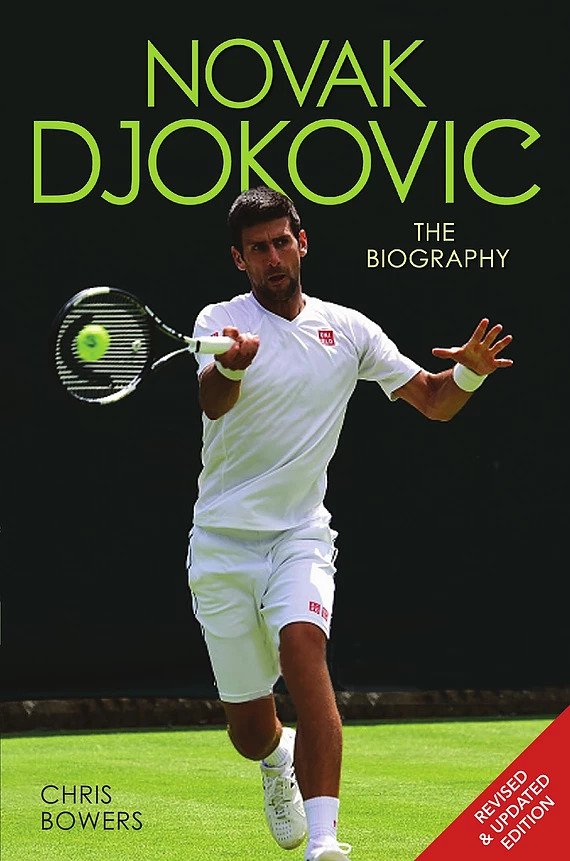
The disqualification of Novak Djokovic from the US Open is one of the biggest stories in this year’s already distorted sporting landscape, but there are two big questions it throws up.
I’m writing this less than half an hour after the dramatic incident which saw the red-hot favourite disqualified for hitting a ball which struck a line umpire in the throat, so I will stick to the legal and procedural issues involved. Despite being Djokovic’s biographer (right), I make no personal judgement as to whether he deserved his fate or not – I am merely saying that, while the decision to disqualify Djokovic has been made and can’t be changed, there will be repercussions.
Firstly, there was no review of any video footage of the incident by the man making the decision. That man was Sören Friemel, one of the most experienced officials in tennis. There is absolutely no question that he made the correct decision within the framework of rules given to him – if a player hits a ball in anger outside a rally and it hits another person, he or she is disqualified. So once Friemel got the umpire’s view that the ball was hit in anger he had no choice but to disqualify Djokovic.
However, the judgement call was whether the ball was hit ‘in anger’. He may have seen the ball being hit as I believe he was in the corner of the Arthur Ashe Stadium, but it was the opposite side of the court from where he was sitting, so he would not have had a great view of it. Yet he has to make a key judgement call. Think of football and the fact that video reviewers analyse footage of an incident to see if it’s a penalty or a red card offence; and they have pitch-side screens for referees to have a look if they choose to. Think of cricket, where decisions about whether a batsman is out are reviewed from every possible and relevant angle.
Tennis has electronic line-calling technology and netcord trembler devices, yet Friemel didn’t get to see a recording of the ball that Djokovic struck after dropping his serve and starting his walk back to his chair. If nothing else, that will almost certainly change after this incident.
Secondly, there is an inherent flaw in the rules here: the seriousness of the offence is directly related to the level of injury sustained by the victim, which is out of sync with legal principle.
Many years ago I was having dinner with two umpires and a supervisor, and I made the point that the rules on ‘aggravated behaviour’ in tennis were flawed. To illustrate my point, I said that the seriousness of attempted murder and murder are the same – if the victim doesn’t die, then it’s attempted murder, not murder, but the penalty in legal systems around the world is by and large the same (otherwise there would be de facto leniency for failure).
When players get angry during a match, they frequently hit balls in anger. If they hit the ball out of the stadium, they will get a warning for the quaint offence of ‘ball abuse’. But if the ball doesn’t hit anyone, it will be no worse than a warning (with a few hundred dollars’ fine). I have seen numerous players hit the ball far harder than Djokovic hit his aberrant ball today which haven’t hit anyone and many of them don’t even incur a warning. Yet a ball hit out of a stadium could hit someone at great speed who had absolutely no right to expect a tennis ball to be speeding towards them, and do great damage.
The three officials felt I was making too much of this. The supervisor said I was overdramatising the issue. If he thought I was equating hitting a ball without sufficient regard for the consequences with premeditated murder, then that would indeed be overdramatising, but I was using the murder analogy for the legal principle that it’s the action that is punished, not the outcome of it. For whatever reason, my officiating dinner partners didn’t take that point, but today’s disqualification of Djokovic vindicates what I was saying.
Because the aspect of the law that caused Djokovic to be disqualified was that the ball hit another person. The fact that it hit a line umpire in the throat and she seemed to have difficulty breathing in the moments after the event made the situation worse. But her ability to breathe had nothing to do with seriousness of Djokovic’s actions. Either Djokovic acted recklessly and deserved to be disqualified even if the ball he hit missed the line umpire completely, or he didn’t, and he should have been allowed to play on regardless of the poor woman’s injury. The penalty for the player has to be related to his action, not to the outcome.
I stress the decision to disqualify him was right within the current rules, and I make no judgement about whether Djokovic deserved to be disqualified even under improved rules. It was a judgement call, and there is a case for both disqualification and letting him play on. But the legal framework within which the highly experienced and positively motivated Sören Friemel had to make his decision is flawed, and that must be changed.
